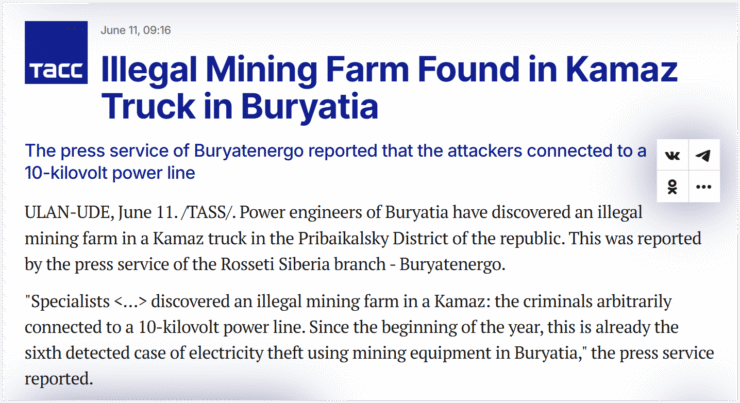Russian authorities have dismantled a covert mobile crypto mining operation hidden inside a KamAZ truck, which was illegally drawing electricity intended for a small village in Buryatia.
The scheme was uncovered during a routine inspection of regional power lines in the Pribaikalsky District, where utility workers detected unusual load patterns. Upon investigation, they discovered a truck outfitted with 95 industrial-grade mining rigs and a mobile transformer station directly connected to a 10-kilovolt power line—enough electricity to power an entire rural settlement.
Two suspects reportedly fled the scene in an SUV moments before police arrived, abandoning the mining equipment. Law enforcement has opened a criminal investigation, marking the sixth electricity theft case linked to crypto mining in Buryatia since the start of 2025.
Local utility Buryatenergo, a subsidiary of Rosseti Siberia, warned of the broader impact of illegal mining. The firm noted that unauthorized connections not only lead to major financial losses but also compromise grid stability, causing voltage drops, overloads, and an increased risk of blackouts.

Russia Ramps Up Crackdown on Illegal Crypto Mining
The incident in Buryatia highlights a broader national effort by Russia to clamp down on unauthorized crypto mining amid a growing energy crunch.
In Buryatia, seasonal restrictions prohibit mining activity from November 15 through March 15 due to heightened electricity demand. Outside of this window, only officially registered entities are allowed to operate—and only within designated areas like the Severo-Baikalsky and Muisky districts.
These localized restrictions are part of a wider federal campaign. In December 2024, Russian authorities expanded the crackdown to other energy-stressed regions such as Dagestan, Chechnya, and occupied territories in eastern Ukraine, where infrastructure remains fragile.
A full-year ban is already in place in the Irkutsk region, once regarded as Russia’s crypto mining capital due to its low electricity costs. Irkutsk also hosts BitRiver’s flagship data center, opened in Bratsk in 2019. However, mounting energy strain and geopolitical tension have turned mining’s energy footprint into a national flashpoint.
As the government recalibrates its energy priorities, regulators are now combining enforcement actions with zoning restrictions in an effort to balance economic activity with grid reliability.
‘Librarian Ghouls’ Hack PCs for Midnight Crypto Mining
A mysterious hacker group known as “Librarian Ghouls”—also referred to as “Rare Werewolf” by cybersecurity analysts—has been identified as the force behind a widespread cryptojacking operation targeting Russian internet users, according to a new report by Kaspersky.
The group deploys malware through phishing emails disguised as official documents. Once installed, the malware disables security programs like Windows Defender and quietly transforms infected computers into mining rigs.
What makes the campaign especially evasive is its operational window: the malware activates between 1 a.m. and 5 a.m., when user activity is low and system monitoring is minimal. During this period, the hackers gain remote access, extract login credentials, and assess each device’s hardware to optimize the mining configuration for maximum output.
The sophistication and stealth of the campaign underscore the growing security challenges posed by illicit crypto operations—both physical and digital—within Russia.
Quick Facts
- Russian police dismantled a $225K mobile mining rig in Buryatia
- The truck tapped into a 10kV line meant for a village
- Buryatia sees its sixth electricity theft case tied to mining in 2025
- Russia enforces seasonal and full-year bans in energy-stressed regions
- Hacker group “Librarian Ghouls” mines crypto via malware from 1–5 a.m.





